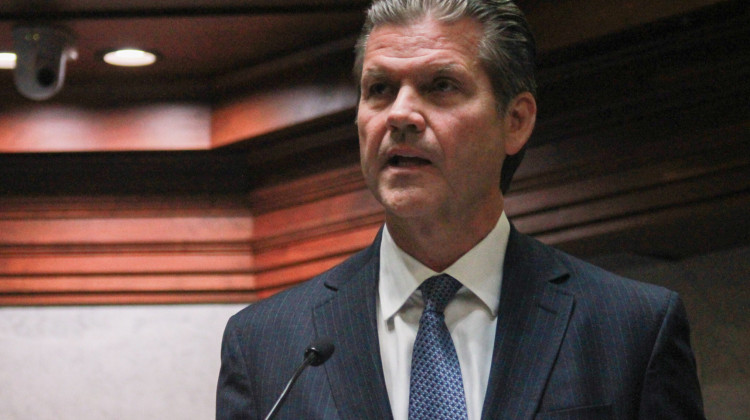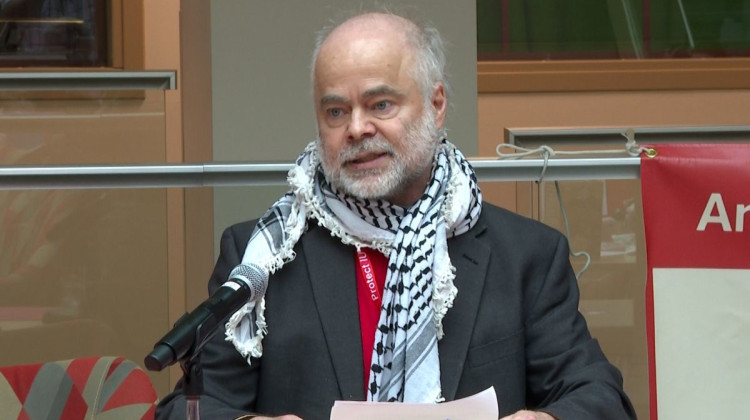
Indiana Virtual School is located in the Parkwood office park at 96th St. and College Ave near the northern edge of Marion County.
Shaina Cavazos/ChalkbeatFederal investigators are scrutinizing the enrollment and financial practices of two Indiana virtual schools on the brink of collapse amid allegations that they took funding for students they never educated, according to a subpoena made public Monday.
And investigators also want to know who got paid with the millions of public funds that flowed to Indiana Virtual School and Indiana Virtual Pathways Academy.
The U.S. Attorney’s Office declined to comment Tuesday. The Federal Bureau of Investigation did not respond to a request for comment.
But a subpoena was included among dozens of documents provided Monday night by the two virtual schools in response to a move to revoke their charters.
The subpoena summoned representatives of Indiana Virtual School and Indiana Virtual Pathways Academy to testify in front of a grand jury Aug. 6 with requested documents, ranging from student files to bank information.
But in front of the Daleville school board on Monday, the online schools’ attorney, Mary Jane Lapointe, disputed any errors in enrollment, contending that “there were no overpayments — in fact, that there were no miscalculations, none. And that in fact, there were always more students enrolled than they were getting paid for.”
The subpoena does not spell out exactly who is being investigated, and why. Grand jury proceedings are secretive — prosecutors present evidence to a grand jury behind closed doors. The 16 to 23 grand jury members are tasked with determining whether there is probable cause to charge an individual with a crime.
Often, grand jury considerations only come to light if an individual is indicted. Then, a case proceeds in court. If a grand jury decides not to indict someone, the public often never finds out, and grand jurors are ordered by law not to disclose their discussions.
Lapointe indicated Monday night that the schools are still compiling their response to the request for documents. She did not return a call for comment Tuesday.
“There’s a tremendous amount of virtual and hard paper that is being collected by the attorneys handling the subpoena,” Lapointe said.
Here’s what we know so far.
Investigators are digging into the schools’ enrollment practices.
A couple of lines in the subpoena appear to be redacted, but the document request includes student files and records on “attendance, course participation, or student presence.”
The subpoena also asks for extensive documentation on enrollment — communication from families or other schools about students enrolling, enrollment applications, and both incomplete and complete enrollment forms. It seeks information about whether people were paid based on recruitment, and any discussions the schools may have had with its authorizer, the state education department, or the U.S. Department of Education about enrollment.
Two other agencies have already looked into enrollment issues at Indiana Virtual School and Indiana Virtual Pathways Academy. Daleville Community Schools, which oversees the two online schools, analyzed course data and said most students never earned any credits throughout the year, and many were not even signed up for any classes.
State auditors discovered that the schools reported re-enrolling students who had moved out of state or students who had been kicked out of the schools for not participating. In one case, Indiana Virtual School kept a student on its rolls after he had died.
State auditors deduced that the schools were likely reporting twice as many students as they actually had enrolled, and their examination of the schools’ finances is still ongoing. The state education department said the schools should return $47 million in state money and cut off future funding.
A line in the subpoena also asks about special education funding — federal dollars that come with strict regulations on how they’re spent.
Lapointe provided numbers on monthly enrollments and withdrawals, pointing out that students enroll throughout the year and that the schools did not have a process for removing inactive students. The numbers contradicted Daleville’s findings, claiming that most students were enrolled in five or more courses.
On Monday night, Lapointe said the schools were holding off on making copies of copious student records for the response to the subpoena. Officials could also waive their right to appear and provide them to an FBI agent to present to the grand jury instead, according to the subpoena.
Investigators also want to know where the money went.
The documents requested through the subpoena could create a detailed map of who has been involved in running and providing services to the two virtual charter schools. The subpoena asks for information on who’s in charge of the two virtual schools and who has any ownership interests in the schools’ businesses. It looks for a list of vendors, contracts, invoices, and receipts.
A Chalkbeat investigation in 2017 raised the question of conflicts of interest between the school’s founder, Thomas Stoughton, and lucrative contracts that the school forged with businesses led by him and his son. An attorney for the schools contended at the time that they could not have started up without support from Stoughton’s business.
Stoughton stepped down from Indiana Virtual School’s board and sold his interest in a business hired to manage the schools, AlphaCom, Inc. It’s unclear whether he is still affiliated with the schools or businesses contracted by the schools.
AlphaCom — which has no online presence — was allowed to charge the schools monthly fees for each student, with extra fees for special education services, according to contracts. AlphaCom could charge more for “supplemental services,” developing or modifying courses, or other special projects. At one point, Indiana Virtual School agreed to pay AlphaCom up to $500,000 for “course gamification.”
In 2018, however, it appears a company called American Pathways Academy took over many of the services that had been provided by AlphaCom. The company is listed at the same address used by both AlphaCom and the schools. An attorney that formerly represented AlphaCom described it as “defunct,” though it still appears active in state business records, and its name repeatedly came up in Monday night’s discussion in Daleville about the problems at the virtual charter schools.
The subpoena hones in on any communications that Stoughton had with the two schools. It also names another individual: Merle Bright, who once signed an agreement with Indiana Virtual School as president of AlphaCom. Contracts show Bright also managed a Florida company called Cyber Educational Services that worked with Indiana Virtual School in 2016 and 2017.
An attorney for Stoughton declined to comment. Bright could not be reached Tuesday.
On Monday night, Lapointe said AlphaCom was building its defense against the allegations of enrollment miscalculations and overpayments.
The group’s response, she said, “is going to be, ‘didn’t do anything wrong at all.’”
It’s possible that some information might never come to light.
The subpoena indicates that investigators are preparing for the possibility that some of the records they have requested may no longer exist. The final line instructs recipients to share information about missing records — including who is responsible for their absence.
“If you have knowledge of any documents that would be responsive to this Subpoena, but has been lost, destroyed, redacted, or discarded,” the subpoena reads, “you shall identify the document to the extent possible, and provide an explanation of the loss, destruction, redaction, or discarding, including identification of each person authorizing or having knowledge of the loss, destruction, reaction, or discarding.”
 DONATE
DONATE







 Support WFYI. We can't do it without you.
Support WFYI. We can't do it without you.